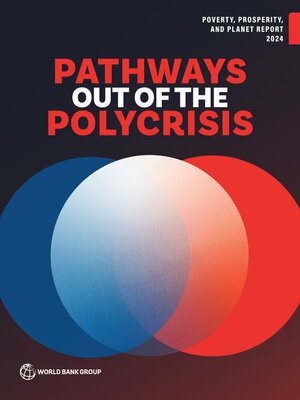Poverty, Prosperity, and Planet Report 2024
ebook ∣ Pathways Out of the Polycrisis · Poverty and Shared Prosperity
By World Bank

Sign up to save your library
With an OverDrive account, you can save your favorite libraries for at-a-glance information about availability. Find out more about OverDrive accounts.
Find this title in Libby, the library reading app by OverDrive.



Search for a digital library with this title
Title found at these libraries:
| Library Name | Distance |
|---|---|
| Loading... |
The Poverty, Prosperity, and Planet Report 2024 is the latest edition of the series formerly knownas Poverty and Shared Prosperity. The report emphasizes that reducing poverty and increasingshared prosperity must be achieved in ways that do not come at unacceptably high costs tothe environment. The current "polycrisis"—where the multiple crises of slow economic growth,increased fragility, climate risks, and heightened uncertainty have come together at the sametime—makes national development strategies and international cooperation difficult.Offering the first post-Coronavirus (COVID)-19 pandemic assessment of global progress on thisinterlinked agenda, the report finds that global poverty reduction has resumed but at a paceslower than before the COVID-19 crisis. Nearly 700 million people worldwide live in extremepoverty with less than US$2.15 per person per day. Progress has essentially plateaued amidlower economic growth and the impacts of COVID-19 and other crises. Today, extreme povertyis concentrated mostly in Sub-Saharan Africa and fragile settings. At a higher standard moretypical of upper-middle-income countries—US$6.85 per person per day—almost one-half of theworld is living in poverty.The report also provides evidence that the number of countries that have high levels of incomeinequality has declined considerably during the past two decades, but the pace of improvementsin shared prosperity has slowed, and that inequality remains high in Latin America and theCaribbean and Sub-Saharan Africa. Worldwide, people's incomes today would need to increasefivefold on average to reach a minimum prosperity threshold of US$25 per person per day.Where there has been progress in poverty reduction and shared prosperity, there is evidence ofan increasing ability of countries to manage natural hazards, but climate risks are significantlyhigher in the poorest settings. Nearly one in five people globally is at risk of experiencing welfarelosses due to an extreme weather event from which they will struggle to recover.The interconnected issues of climate change and poverty call for a united and inclusive effortfrom the global community. Development cooperation stakeholders—from governments,nongovernmental organizations, and the private sector to communities and citizens actinglocally in every corner of the globe—hold pivotal roles in promoting fair and sustainabletransitions. By emphasizing strategies that yield multiple benefits and diligently monitoring andaddressing trade-offs, we can strive toward a future that is prosperous, equitable, and resilient.







